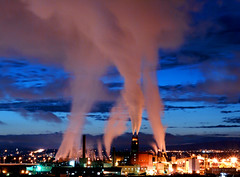
![]() Photo credit: pfala
Photo credit: pfala
"Our study convinced us that current choices regarding carbon dioxide emissions will have legacies that will irreversibly change the planet," said Solomon, who is based at NOAA's Earth System Research Laboratory in Boulder, Colo.
"It has long been known that some of the carbon dioxide emitted by human activities stays in the atmosphere for thousands of years," Solomon said. "But the new study advances the understanding of how this affects the climate system."
According to the IPCC we will head towards 1000 ppm by the end of the century that if we continue on the current emission path. Joseph Romm over at Climate Progress says "that would put essentially every at risk region into conditions worse than the Dust Bowl for a long, long, long time. Clearly we must peak no higher than 450 ppm". The bottom line is that "a few decades of prevention is worth 1,000 years of misery," Romm said.
Solomon doesn't put much faith in geo-engineering and the possibilities of it to help stop the rising levels of carbon dioxide:
Sure, geo-engineering with our climate might work. Or it might not, and we end up wasting precious time and resources on it. We should not put our hopes into geo-engineering. Instead, as Solomon said, we need to reduce our emissions now. There is no other easy fix or solution to this man-made problem.
Also read:
- Obama warns of "irreversible catastrophe" on climate, says he will not deny facts

Recommended Comments
There are no comments to display.
Join the conversation
You can post now and register later. If you have an account, sign in now to post with your account.